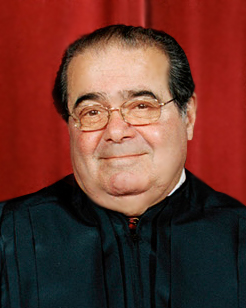
Portrait of John Locke, by Sir Godfrey Kneller. Oil on canvas. 76x64 cm. Britain, 1697. Source of Entry: Collection of Sir Robert Walpole, Houghton Hall, 1779. (Photo credit: Wikipedia)
Cognitive dissonance seems to increasingly define American politics. Jennifer Stefano's op ed column in The New York Times ["This Isn't What the Tea Party Fought For," February 18, 2018] is a perfect illustration of the disconnect between the aspirational worldview of millions of Americans and the reality of the U.S. political and economic system as it actually exists today.
Stefano describes herself as someone who "... like millions of others, was becoming the new American radical, defined by my belief in a limited government that allows people, not bureaucracy, to flourish." Before she became a self-proclaimed Tea-Party enthusiast, she stated that "my main contributions to American politics were voting, voraciously reading American history and Austrian economic theory and irritating liberals at dinner parties."She further proclaims that her commitment to the Tea Party stems from her long-held belief "in an America with opportunity for all and favoritism for none.
The gravamen of Ms. Stefano's lament is that, because of government overreach "Americans are being robbed of the chance to pass on a more prosperous country than we were given. Median household income peaked in 1999 and didn't recover until 2016. That's a generation of workers who are worse off than their parents, thanks, in part, to out-of-control government spending."
Ms. Stefano is so misinformed, on so many counts, that it is hard to know precisely where to begin. For starters, Ms. Stefano's belief in limited government is hardly radical. In fact, it is profoundly reactionary since the origin of that idea stems from the late 16th century olitical philosophy of John Locke. Locke advanced a theory of limited government that was designed to protect the rights of individuals.
A century later, Jefferson and Madison, among others, were so enamored of Locke's politics that they incorporated his political convictions into the constitutional framework of the United States government. Locke's ideas were thus were inextricably woven into this country's political institutions. The institutionalization of that framework and the internalized worldview created by Locke'spolitics continue to shape and to inform American political discourse to the present.
Secondly, Ms. Stefano's professed commitment to "Austrian economic theory and irritating liberals at dinner parties" reveals her ignorance of Western political theory. Within the tradition of political theory, Locke's political philosophy is properly called liberalism. It asserts that human beings are by nature solitary, aggrandizing individuals and that, consequently, the preferred form of social and political relationships with others, including the state as the organized expression of political society, is solely contractual.
Locke's ideology, because it apotheosizes the individual, asserts that the self alone is the irreducible unit and concrete reality upon which all political societies and their governments are organized; and that the promotion and protection of the individual and his interests, particularly s they relate to property, are the primary objects of all public policy. Thus, Stefano is herself a liberal, not a radical or a conservative, and the Austrian economic theory she embraces is a
lineal descendent of the commitment to unbridled competition and acquisition propounded by Locke, and his intellectual disciples, David Hume and Adam Smith.
Ms. Stefano is unaware of the intellectual roots of the kind of politics that she espouses. Further, because her ideological commitment to these antiquated ideas is so intense, she is blind to the fact that, while political ideas are neither true nor false per se, it is possible to track and to evaluate the consequences of the policy decisions that are based upon those ideas.
For those with eyes who wish to see, the country in which we live is no longer, if it ever was, a society of individuals equally competing with one another for shared political and economic power, nor do they compete on an equal footing in John Stuart Mills' fabled marketplace of ideas. Yes, it is true that "Americans are being robbed of the chance to pass on a more prosperous country than we were given" and that "Median household income peaked in 1999 and didn't recover until 2016 " and "That's a generation of workers who are worse off than their parents." But Ms. Stefano mistakenly attributes the causes to a bloated, out-control government.
While it is true that overall government spending needs to be reigned in (Isn't the military budget an excellent place to start?), wage stagnation and inequality of opportunity have primarily been caused by a lack a lack of government regulation, government acquiescence to, and domination by, corporate interests, and the movement towards monopoly capitalism.
In sark contrast to Western European democracies, since the passage of the Taft-Hartley Act, an ever-increasing number of states in the union have enacted laws that make it virtually impossible for employees to unionize and to bargain collectively for increased wages and better working conditions. The dramatic decline in union participation and membership since the 1950s is the largest single factor in explaining wage stagnation.
Second, the courts in every state in the union, with the exception of Montana, have adopted the concept of "at-will" employment. That judicially-created fiction arose after the Civil War and endorsed Herbert Spencer's Social Darwinism in which the "weakest" among us have been left without any legal recourse.
Third, unfair trade laws, out-sourcing, and automation have reduced the number and kinds of jobs available and the wages that they pay. The economic harm caused by the three trends has been exacerbated by a lack of government financial assistance and job-retraining for those workers who have been displaced.
Fourth, the refusal to impose reasonable limits upon inherited wealth has created a society that has become increasingly unequal and gives the lie to the myth of equality of opportunity. With each generation, the descendants of the wealthy, solely by the good fortune of their births, become ever wealthier while everyone else is left to forage on his own.
Fifth, the decline in anti-trust enforcement has permitted ever bigger entities to monopolize the marketplace and to exact rents to the detriment of small businesses and consumers.
Lastly, the adoption of a myriad of policies advocated by the Trump administration and the GOP-controlled Congress will further gut the already meager safety net. Those policies include drastic budget cuts in foods assistance (SNAP), job training, Medicare, Medicaid, private school savings accounts and the privatization of many other public goods that will condemn millions of Americans to a life-time of poverty.
Contrary to Ms. Stefano's convictions, enlightened government policies, enacted to promote the public's well-being, can and have made a substantial difference for the better in the lives of ordinary Americans. Government in a democracy should never be viewed as our enemy but as our servant - as one that should be used as a positive instrument for the public good and, in the words of A.D. Lindsay, to "hinder the hindrances" that stand in the way of every citizen's self-advancement.
By contrast, corporations will never invest in public goods or in the well-being of our country's citizens unless they can be guaranteed a profit. Doesn't that economic reality run counter to the kind of an economy based upon unfettered competition and government minimalism that Ms. Stefano's advocates?


